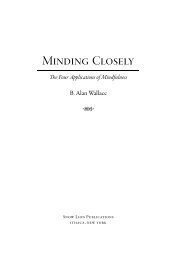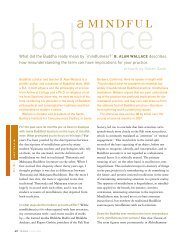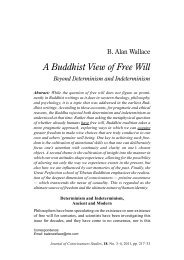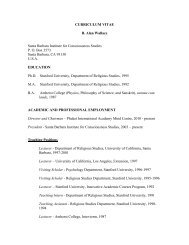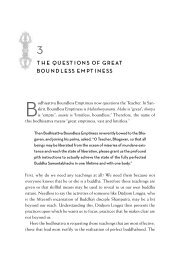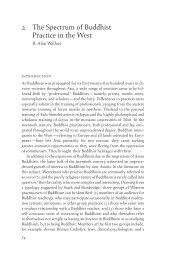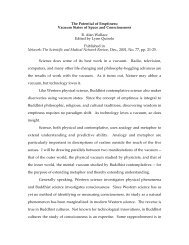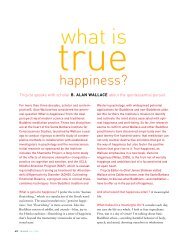“A Science of Consciousness: Buddhism (1), the ... - B. Alan Wallace
“A Science of Consciousness: Buddhism (1), the ... - B. Alan Wallace
“A Science of Consciousness: Buddhism (1), the ... - B. Alan Wallace
Create successful ePaper yourself
Turn your PDF publications into a flip-book with our unique Google optimized e-Paper software.
agitation and dullness, so if <strong>the</strong> mind is to be used as a reliable tool for exploring<br />
and experimenting with consciousness, <strong>the</strong>se dysfunctional traits need to be<br />
replaced with attentional stability and vividness.<br />
While <strong>the</strong> philosophers <strong>of</strong> ancient Greece were certainly interested in <strong>the</strong><br />
nature <strong>of</strong> <strong>the</strong> mind, <strong>the</strong>re is little evidence that <strong>the</strong>y developed any sophisticated<br />
means for refining <strong>the</strong> attention. The Pythagorean bro<strong>the</strong>rhood and <strong>the</strong> mystery<br />
schools may have devised such methods, but if <strong>the</strong>y did, such knowledge has not<br />
been preserved. Jewish mystics also wrote extensively on <strong>the</strong> nature <strong>of</strong><br />
consciousness, 1 but <strong>the</strong> development <strong>of</strong> techniques to cultivate attentional<br />
stability and vividness for <strong>the</strong> rigorous exploration <strong>of</strong> consciousness was not a<br />
strong suit <strong>of</strong> this tradition ei<strong>the</strong>r. The Greeks did coin <strong>the</strong> term eudaimonia,<br />
commonly translated as genuine happiness, or human flourishing, referring to<br />
“<strong>the</strong> perfect life” in so far as perfection is attainable by humanity. For Plotinus,<br />
<strong>the</strong> source <strong>of</strong> genuine happiness lies within <strong>the</strong> human spirit, but when <strong>the</strong><br />
concept <strong>of</strong> eudaimonia was absorbed into <strong>the</strong> Christian tradition, Augustine<br />
insisted that <strong>the</strong> soul must look outside itself—to God—for such perfection. 2<br />
However, it must be added that a principal way he taught to go about this<br />
endeavor was through a contemplative process that draws <strong>the</strong> attention inwards,<br />
going beyond <strong>the</strong> self to a direct encounter with God, <strong>the</strong> very source <strong>of</strong><br />
eudaimonia. 3 In this regard, perhaps <strong>the</strong> fundamental difference between Plotinus<br />
3



